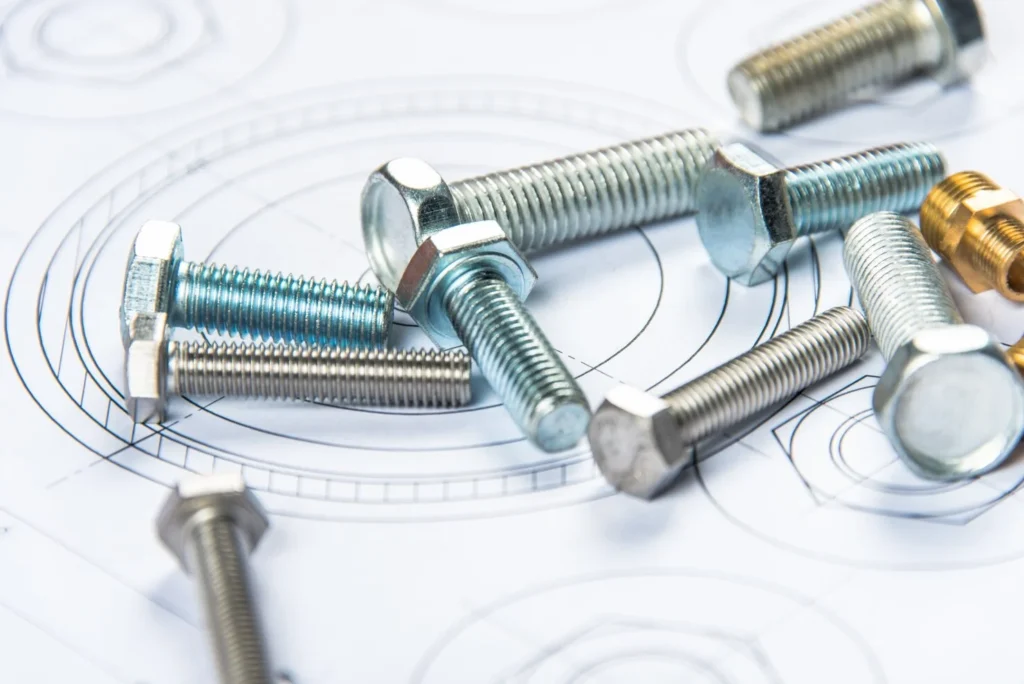The composition of screw material is important for ensuring the durability and longevity of your project. Depending upon the project’s nature and requirements, choosing appropriate types of machine screws is essential and best suited for your project. A screw fastener holds the project components together ensuring the best-quality results.
In this blog, we will learn about various types of machine screws based on their material composition, exploring their unique properties and ideal use case scenario.
Types of Machine Screws by Material Composition
Companies manufacture machine screws in diverse material ranges. Each material has its advantages and disadvantages. Let’s understand in detail, the properties of the most commonly used material in machine screws.
1. Steel Screws
Let’s understand and learn about some of the important characteristics of steel screws
Strength: Steel is a highly valuable material known for its high tensile strength, making it suitable for heavy-duty applications. It has high corrosion resistance and high durability making it resilient to harsh conditions.
Cost-effective: Generally steel is considered highly cost-effective and affordable compared to other materials. However, some steel grades could be highly costly depending on the properties one exhibits.
Versatility: Steel can be treated with coatings like zinc and chromium to enhance corrosion resistance and other properties.
Applications: Steel Screws are majorly used in Automobile, Construction, and different types of machinery due to their strength and reliability. They excel in holding the two components together for a long time.
2. Stainless Steel Screws
Let’s understand and learn about some of the important characteristics of stainless steel screws.
Corrosion Resistance: Stainless steel offers excellent resistance to rust and corrosion. The stainless steel screws are made from a steel alloy that contains a minimum of 10.5% chromium, making it ideal for outdoor or marine environments.
Aesthetic Appeal: Stainless steel machine screw is manufactured using chromium to offer a shiny finish surface and is often preferred for visible applications.
Applications: Commonly used in kitchen appliances, medical equipment, and outdoor structures where exposure to moisture is a concern.
3. Brass Screws
Let’s understand and learn about some of the important characteristics of brass screws.
Malleability: Brass is a softer material as compared to steel. Brass is malleable in nature, hence it is easy to give shape to brass material which makes it perfect for machining and shaping.
Corrosion Resistance: Brass is naturally resistant to corrosion due to its low zinc content. The lower the zinc content in metal alloys higher the corrosion resistance in the metal alloy.
Applications: Brass is often used in electrical applications due to its non-magnetic properties and aesthetic appeal in decorative items.
4. Aluminum Screws
Let’s understand and learn about some of the important characteristics of aluminium screws.
Lightweight: Aluminium screws are lighter in weight in comparison to brass and steel.
Corrosion Resistance: Aluminium is naturally resistant to corrosion, especially when anodized. It forms a thin, hard, & protective layer when it comes in contact with oxygen.
Applications: Ideal for aerospace applications or any situation where weight reduction is critical without sacrificing strength.
5. Alloy Screws
Let’s understand and learn about some of the important characteristics of alloy screws.
Durability: Made using different materials, alloy screws are durable in nature and offer a long life.
Corrosion Resistance: Due to their built quality, alloy screws are generally resistant to corrosion, making them ideal for construction.
Fatigue performance: Alloy screws can perform well at elevated temperatures and under repeated or fluctuating stresses.
Factors Affecting Material Choice
1. Environmental Conditions
The environment has a crucial role to play in the use of machines’ screws. For corrosive and humid environments, stainless steel or alloy screws might be suitable. However, for high-stress applications, which require a high-strength and robust build, steel screws might be preferred.
2. Load Requirements
Choosing among types of machine screws as per the load requirement is another factor to consider. The type of load that the screw will bear defines the choice of material. For heavy-duty applications typically steel or stainless steel screws are used. While for lightweight applications nylon or aluminium screws are preferred.
3. Cost Considerations
Select the screw material considering your budget. In comparison to stainless steel or brass screws, steel screws are more cost-effective. However, superior-quality screws can reduce the long-term cost associated with maintenance and replacement.
Conclusion
Choosing the right material for machine screws is vital for performance and durability. Understanding material properties helps engineers make informed decisions, whether opting for steel in heavy machinery or aluminium in aerospace, leading to better design and application results.
Get superior quality machine screws from LP Screw, trusted & largest ss screw manufacturer in India. Visit the website for more information.







